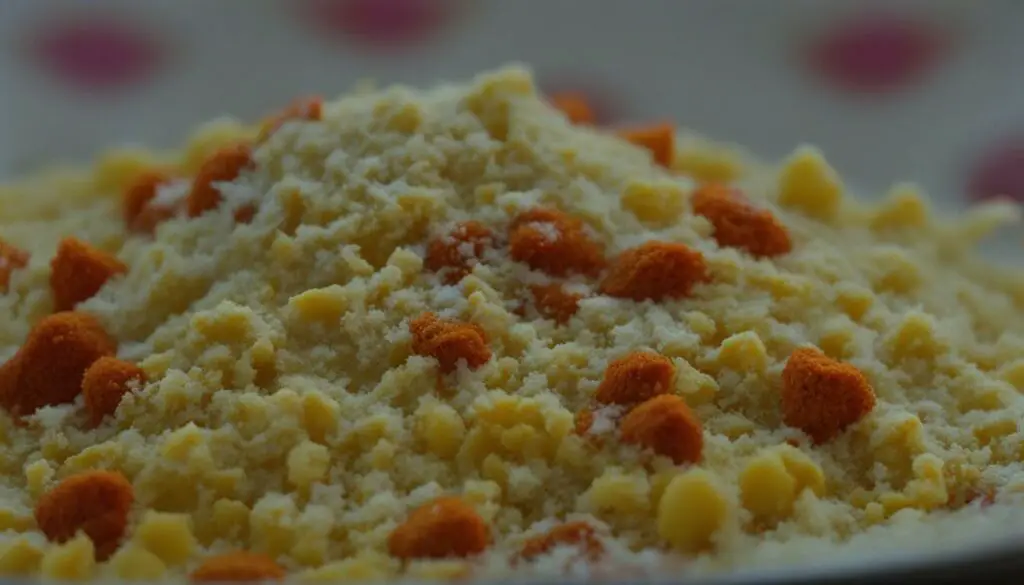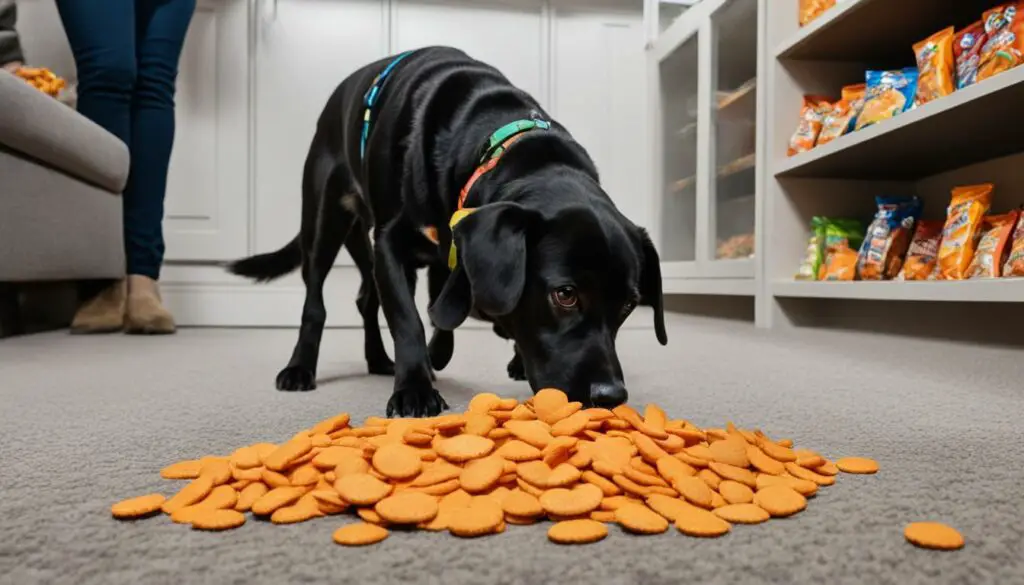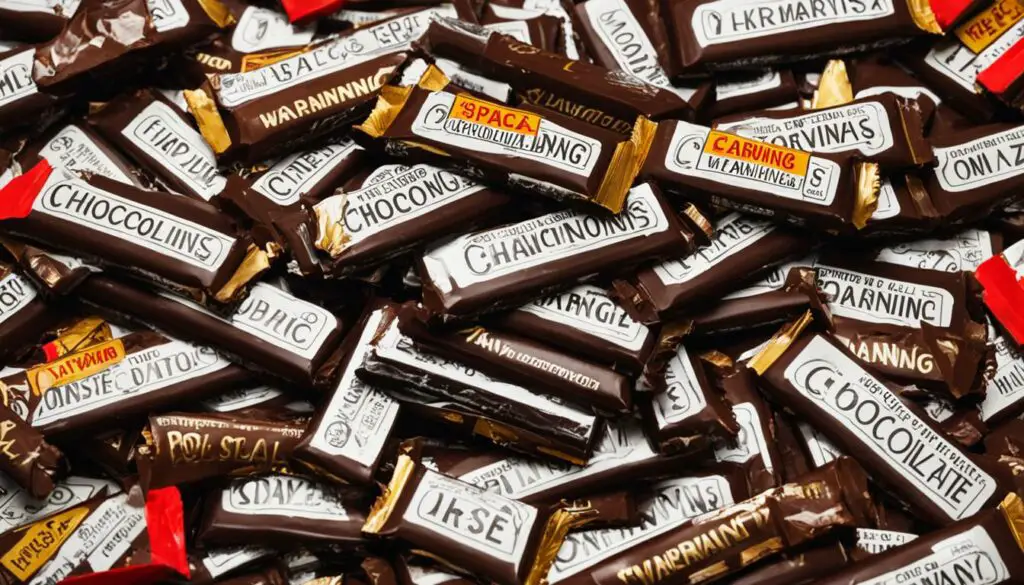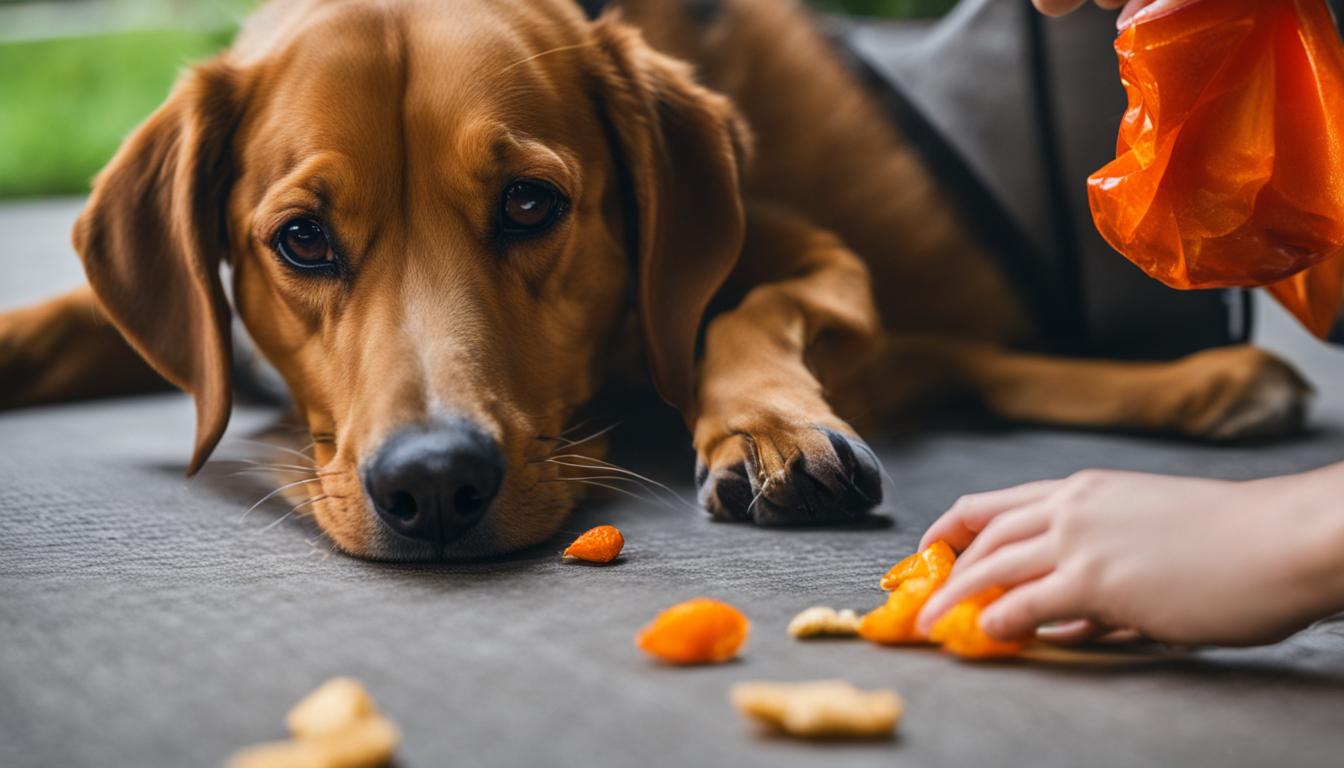Last Updated on 5 months by admin
Goldfish crackers are a popular snack enjoyed by many, but can dogs safely indulge in them? While it’s not recommended to feed goldfish crackers to dogs regularly, occasional consumption is unlikely to cause harm. These crackers contain ingredients like enriched wheat, cheddar cheese, vegetable oils, salt, and onion powder, which may not be beneficial for our canine companions. These ingredients can contribute to health issues such as obesity, diabetes, and digestive problems. However, if a dog ingests a small amount of goldfish crackers, they are unlikely to experience any adverse effects. As always, it’s best to consult with a veterinarian before introducing any new food into your dog’s diet.
Key Takeaways:
- Feeding goldfish crackers to dogs should be done sparingly due to the lack of nutritional benefits.
- The ingredients in goldfish crackers can lead to health issues such as obesity and digestive problems in dogs.
- It is best to consult with a veterinarian before introducing any new food into your dog’s diet.
- There are healthier snack options for dogs, such as fruits, vegetables, and dog-specific treats.
- If your dog accidentally consumes a large quantity of goldfish crackers, monitor them for any signs of discomfort and consult with a veterinarian if necessary.
Goldfish Crackers: Here Is What They Are Made Of

Goldfish crackers are a beloved snack enjoyed by many people. But what exactly are they made of? Let’s take a closer look at the ingredients in goldfish crackers.
| Ingredients |
|---|
| Enriched wheat |
| Cheddar cheese |
| Vegetable oils |
| Salt |
| Onion powder |
Goldfish crackers are primarily made with enriched wheat, cheddar cheese, vegetable oils, salt, and onion powder. While enriched wheat is not toxic to dogs, it does not provide many health benefits. Dogs may have difficulty digesting grains, and consuming too many empty carbs can lead to health issues such as diabetes and obesity.
Cheddar cheese, another ingredient in goldfish crackers, is a decent source of protein and contains important nutrients like calcium and vitamin B. However, it also contains fat that is not ideal for dogs.
Vegetable oils, which are unnecessary for a dog’s diet, are also found in goldfish crackers. Dogs already get the necessary fatty acids from balanced commercial food, so additional vegetable oils are not required.
Salt and onion powder, two ingredients commonly used in goldfish crackers, can be harmful to dogs if consumed in large quantities. Salt can cause dehydration and salt toxicity, while onion powder can lead to serious health problems such as anemia and weakness.
In summary, goldfish crackers are made primarily with enriched wheat, cheddar cheese, vegetable oils, salt, and onion powder. While small amounts of these crackers may not cause immediate harm to dogs, it is important to be cautious and mindful of their overall diet and health.
Should Dogs Eat Goldfish Crackers or Not?
In general, it is best to avoid feeding goldfish crackers to dogs. While a small amount of goldfish crackers as an occasional treat may not be harmful, they do not provide many nutritional benefits for dogs. Dogs should focus on consuming a balanced diet that includes fruits, vegetables, and commercial treats specially formulated for their needs. Offering goldfish crackers sparingly, and in small quantities, is unlikely to cause harm. However, it is always important to consult with a veterinarian before introducing any new food into a dog’s diet to ensure it is safe for them.
Are Goldfish Crackers Safe for Dogs?

While goldfish crackers are not considered a healthy or recommended snack for dogs, consuming a small amount is generally safe. The high salt content, along with other ingredients like onion powder, can be potentially harmful if consumed in large quantities. The occasional indulgence in a few goldfish crackers is unlikely to cause immediate harm to a dog, but consistent feeding of these snacks can contribute to health issues such as obesity and digestive problems. It is important to monitor a dog’s overall diet and ensure they receive balanced nutrition from appropriate sources.
Risks of Dogs Eating Goldfish Crackers
Feeding goldfish crackers to dogs poses certain risks due to the ingredients found in these snacks. The high salt content in goldfish crackers can lead to dehydration and salt toxicity if consumed excessively. Dogs are also sensitive to onion powder, which can cause anemia and weakness. While a small amount of goldfish crackers may not be immediately harmful, it’s best to avoid consistent feeding to prevent long-term health issues.
“Feeding goldfish crackers to dogs in moderation is unlikely to cause harm, but it’s important to monitor their overall diet.”
To better understand the potential hazards of goldfish crackers for dogs, let’s take a look at a breakdown of their ingredients:
| Ingredients | Potential Risks |
|---|---|
| Enriched wheat | No immediate harm, but lacks nutritional benefits |
| Cheddar cheese | Contains beneficial protein and nutrients, but also high in fat |
| Vegetable oils | Unnecessary for a dog’s diet as they already receive necessary fatty acids from balanced commercial food |
| Salt | High salt content can lead to dehydration and salt toxicity |
| Onion powder | Potentially harmful ingredient, causing anemia and weakness in dogs |
As shown in the table, goldfish crackers contain ingredients that are not ideal for a dog’s diet. While a small indulgence may not cause immediate harm, it’s important to prioritize a balanced and appropriate diet for your furry friend’s overall health and well-being.
What Should I Do if My Dog Has Eaten Lots of Goldfish Crackers?

If your dog has accidentally consumed a large quantity of goldfish crackers, it’s important to monitor them closely for any signs of discomfort or illness. While a few goldfish crackers may not cause immediate harm, consuming a large amount can potentially lead to digestive issues and other complications.
Look out for the following symptoms that may indicate a problem:
- Increased thirst
- Vomiting
- Diarrhea
- Abdominal discomfort
- Lethargy
- Seizures
If you notice any of these symptoms, it’s crucial to contact your veterinarian for guidance. They will be able to assess the situation and provide appropriate advice and treatment if necessary.
In most cases, if a dog consumes only a handful of goldfish crackers, they may experience minor stomach upset, and the symptoms will likely resolve on their own. However, serious complications are rare but can occur depending on the dog’s individual health and the amount consumed. As a responsible pet owner, it’s always best to err on the side of caution and seek professional advice.
Expert Tip:
“If your dog has eaten a large quantity of goldfish crackers, it’s essential to observe their behavior and monitor for any abnormal signs. Even if the initial symptoms seem mild, it’s crucial to consult a veterinarian to rule out any potential complications and ensure your dog’s well-being.”
– Dr. Emily Thompson, DVM
Remember, prevention is always better than cure. To avoid such incidents in the future, it’s important to keep goldfish crackers and other potentially harmful snacks out of your dog’s reach. Providing a balanced and nutritious diet, along with appropriate dog-friendly treats, is the best way to ensure your dog’s health and happiness.
Are There Other Potentially Harmful Snacks?

Aside from goldfish crackers, there are several other snacks that can be potentially harmful to dogs and should be avoided. It’s important to be aware of these snacks to ensure the safety and well-being of your furry friend.
1. Chocolate
Chocolate, especially dark chocolate, is toxic to dogs and can cause a range of symptoms including increased heart rate, tremors, and even death. Theobromine, a substance found in chocolate, is difficult for dogs to metabolize and can have serious health consequences if ingested in large quantities.
2. Grapes and Raisins
Grapes and raisins can be toxic to dogs and can cause kidney failure. Although the exact mechanism is not yet understood, even small amounts of grapes or raisins can be harmful to dogs, leading to symptoms such as vomiting, diarrhea, and lethargy.
3. Macadamia Nuts
Macadamia nuts are known to cause nerve and muscle issues in dogs. Just a few nuts can lead to symptoms such as weakness, tremors, and difficulty walking. It is best to keep macadamia nuts out of your dog’s reach to prevent any potential health problems.
4. Processed Potato Snacks
Processed potato snacks like chips often contain excessive salt and flavorings that can be harmful to dogs. These snacks can lead to dehydration and contribute to conditions like obesity and high blood pressure. It’s best to avoid sharing these types of snacks with your canine companion.
5. Candies and Sweets
Candies and sweets that are high in sugar should be avoided when it comes to your furry friend’s diet. These treats can contribute to weight gain, dental issues, and other health problems. Additionally, some sugar-free options may contain xylitol, a sweetener that is toxic to dogs and can cause liver damage.
When it comes to treating our furry friends, it’s important to choose snacks that are not only delicious but also nutritious. Luckily, there are plenty of safe and healthy options that dogs can enjoy alongside their regular diet. Here are some dog-friendly snacks that will make your pup’s tail wag with delight:
1. Plain Popped Popcorn
Popcorn can be a great low-calorie treat for dogs, as long as it is plain and unsalted. It’s a crunchy snack that dogs find enjoyable, and it’s a good source of fiber. Just make sure to remove any unpopped kernels to prevent choking hazards.
2. Vegetable Sticks
Vegetables like cucumbers and carrots make excellent snacks for dogs. They are crunchy, low in calories, and packed with vitamins and minerals. Plus, they provide a satisfying chewing experience for your furry friend.
3. Lean Strips of Cooked Meat
For a protein-packed snack, consider offering your dog lean strips of cooked chicken or turkey. These mouthwatering treats are not only tasty but also provide essential nutrients that support your pup’s overall health. Just be sure to remove any bones and refrain from using seasoning or spices.
4. Peanut Butter in Moderation
Peanut butter is a popular treat among dogs, and it can be a great source of healthy fats and protein. However, it’s important to use it in moderation due to its high calorie content. Look for peanut butter that doesn’t contain xylitol, a sweetener that is toxic to dogs.
5. Fruits and Vegetables
Fruits and vegetables can be a refreshing and nutritious addition to your dog’s diet. Some safe options include watermelon (remove the seeds and rind), butternut squash (cooked and cooled), bananas, berries, and kiwi. However, it’s crucial to avoid grapes and raisins, as they can be toxic to dogs.
Remember, treats should only make up a small portion of your dog’s overall diet. It’s important to choose snacks that complement their regular meals and provide additional nutrients. Consulting with your veterinarian can help determine which snacks are best suited for your dog’s specific dietary needs.
| Snack | Nutritional Benefits |
|---|---|
| Plain Popped Popcorn | Low in calories, good source of fiber |
| Vegetable Sticks | Crunchy, low-calorie, rich in vitamins and minerals |
| Lean Strips of Cooked Meat | Protein-packed, supports overall health |
| Peanut Butter (in moderation) | Healthy fats, protein, avoid xylitol |
| Fruits and Vegetables | Refreshing, nutritious (avoid grapes and raisins) |
Conclusion
In conclusion, while dogs can technically eat goldfish crackers, it is not recommended to include them as a regular part of their diet. Goldfish crackers are made with ingredients like enriched wheat, cheddar cheese, vegetable oils, salt, and onion powder, which may not be beneficial for dogs. These ingredients can contribute to health issues such as obesity, diabetes, and digestive problems. While small amounts of goldfish crackers are unlikely to cause immediate harm, the nutritional content of these snacks is not ideal for dogs.
It is best to focus on providing dogs with a balanced diet that includes appropriate sources of nutrition. Dogs should primarily consume a diet that includes fruits, vegetables, and commercial treats made specifically for dogs. Introducing new foods into a dog’s diet should always be done under the guidance of a veterinarian to ensure their health and safety.
Overall, goldfish crackers should be given to dogs sparingly, if at all. It is always important to prioritize their health and well-being by offering them snacks that are specifically formulated for their nutritional needs. Consulting with a veterinarian is key to making informed decisions about what is safe and beneficial for your dog.
FAQ
Can dogs safely eat goldfish crackers?
While it is not recommended to feed goldfish crackers to dogs regularly, occasional consumption is unlikely to cause harm.
What are goldfish crackers made of?
Goldfish crackers are made primarily with enriched wheat, cheddar cheese, vegetable oils, salt, and onion powder.
Should dogs eat goldfish crackers or not?
It is best to avoid feeding goldfish crackers to dogs, as they do not provide many nutritional benefits and can contribute to health issues.
Are goldfish crackers safe for dogs?
Consuming a small amount of goldfish crackers is generally safe for dogs, but it is important to monitor their overall diet and consult with a veterinarian.
What should I do if my dog has eaten lots of goldfish crackers?
If a dog has consumed a large quantity of goldfish crackers, it is important to monitor them for any signs of discomfort or illness and seek veterinarian guidance if needed.
Are there other potentially harmful snacks for dogs?
Yes, there are several other snacks that can be potentially harmful to dogs and should be avoided, such as chocolate, grapes, raisins, macadamia nuts, processed potato snacks, and candies high in sugar.
Some healthy snacks that dogs can safely enjoy include plain popped popcorn, vegetable sticks like cucumber and carrots, lean strips of cooked meat like chicken or turkey, and certain fruits (avoid grapes and raisins).
Can dogs eat goldfish?
While dogs can technically eat goldfish, it is not recommended to include them as a regular part of their diet. It is best to focus on providing dogs with a balanced and appropriate diet.
Source Links
- https://www.hepper.com/can-dogs-eat-goldfish-crackers/
- https://www.loveyourdog.com/can-dogs-eat-goldfish-crackers/
- https://petkeen.com/can-dogs-eat-goldfish-crackers/


